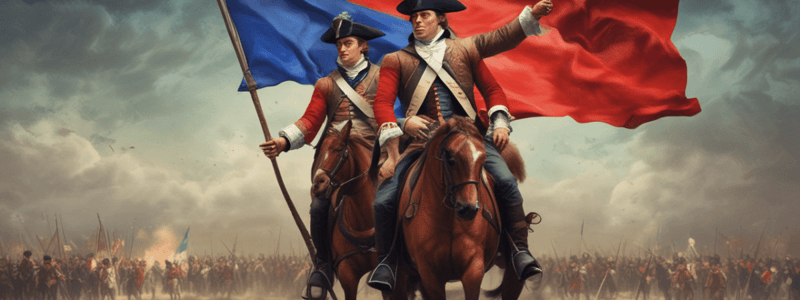Podcast
Questions and Answers
What was the outcome of the King's trial by the National Convention?
What was the outcome of the King's trial by the National Convention?
- He was convicted of treason and executed (correct)
- He was imprisoned for life
- He was exiled to a remote island
- He was acquitted and reinstated as King
Who led the Committee of Public Safety and governed France as a dictator during the Reign of Terror?
Who led the Committee of Public Safety and governed France as a dictator during the Reign of Terror?
- Maximilien Robespierre (correct)
- Jean-Paul Marat
- Napoleon Bonaparte
- Paul Barras
What was the outcome of the Reign of Terror?
What was the outcome of the Reign of Terror?
- The revolution was overthrown
- Thousands of people were executed on flimsy charges (correct)
- The monarchy was restored
- A new Constitution was written
What was the name of the new government established in 1795?
What was the name of the new government established in 1795?
What was the significance of September 21, 1792?
What was the significance of September 21, 1792?
Who were the enemies of the Revolution?
Who were the enemies of the Revolution?
What was the role of women in the Revolution?
What was the role of women in the Revolution?
How many troops were ordered into the army by the National Convention?
How many troops were ordered into the army by the National Convention?
What was the outcome of Robespierre's rule?
What was the outcome of Robespierre's rule?
Who did the Directory find in 1795?
Who did the Directory find in 1795?
Flashcards are hidden until you start studying
Study Notes
The French Revolution Continues
- The Storming of the Bastille on July 14, 1789, marked the beginning of the French Revolution.
- Widespread riots and protests erupted across France, with peasants destroying noble palaces and burning legal papers that bound them to the nobles, effectively ending feudalism.
The Great Fear and the End of Feudalism
- August 4, 1789, the National Assembly abolished feudal privileges, making all French citizens equal.
- Nobles and clergy supported the mobs out of fear, rather than for enlightenment ideas.
The Declaration of Rights
- The Declaration of the Rights of Man and of the Citizen was adopted, with the slogan "Liberty, Equality, and Fraternity."
- Olympe De Gouges wrote the Declaration of the Rights of Women, but it was rejected, and she was eventually executed in 1793.
The Role of the Church and State
- The government took control of the French Catholic Church, selling its lands to pay off national debt.
- Peasants opposed the Church and State being under one control and believed the Pope should have authority over Church matters.
The Royal Family and the新Constitution
- The royal family tried to escape in 1791 but were captured and returned to Paris.
- A new constitution was created, establishing a limited constitutional monarchy with the king having little power.
The Legislative Assembly and Factions
- The Legislative Assembly had three factions: liberal, moderate, and conservative.
- The Sans-Culottes, or workers, wanted more radical reforms but had no part in the government.
War and Foreign Intervention
- The Legislative Assembly declared war on Austria and Prussia in 1792.
- Monarchs and nobles in Europe were worried about the spread of revolutionary ideas.
The Fall of the Monarchy
- The royal family was imprisoned, and the king was eventually executed by guillotine in 1793.
The Reign of Terror
- Maximilien Robespierre gained control of the National Convention in 1793, aiming to create a 'Republic of Virtue.'
- He governed as a dictator, executing up to 40,000 people on flimsy charges, many of whom were poor.
The End of the Reign of Terror
- Former members of the National Convention arrested Robespierre in July 1794, and he was executed.
- A new government, The Directory, was established in 1795, consisting of five moderate men.
The Rise of Napoleon
- The Directory found Napoleon Bonaparte, marking the beginning of a new era in French history.
Studying That Suits You
Use AI to generate personalized quizzes and flashcards to suit your learning preferences.



